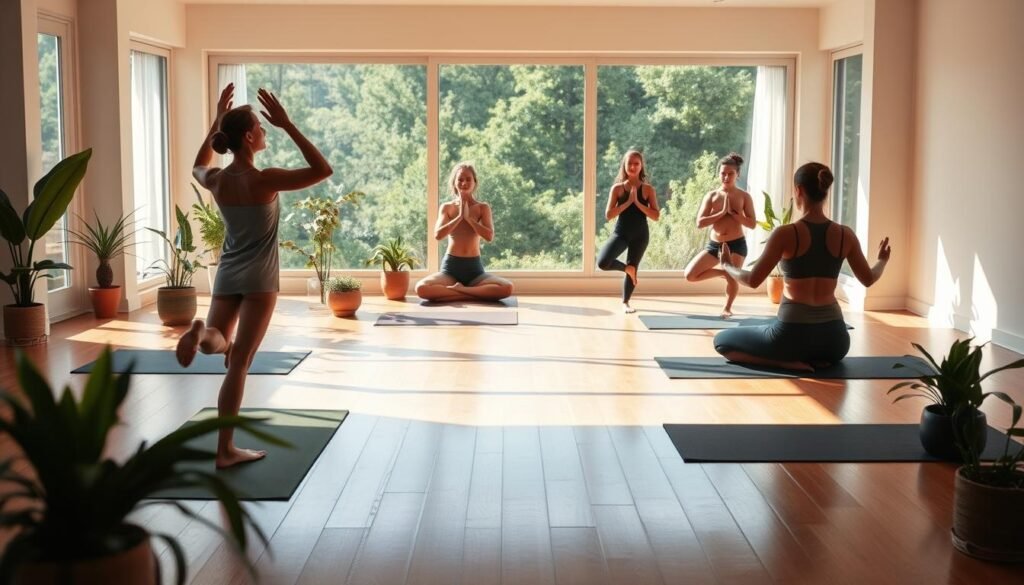Can yoga really help reduce anxiety and stress? It can, by combining physical movement, breathing, and meditation. This ancient practice boosts mental well-being, including reducing anxiety and stress. It helps people become more aware of themselves, making it easier to manage their mental health.
Yoga is a holistic practice that helps reduce anxiety and stress. It’s great for mental health, making it a valuable part of any routine. By adding yoga to your daily life, you can feel happier and healthier.
Introduction to Yoga and Mental Health
Yoga has been around for centuries and is known for its mental health benefits. It combines physical movement, breathing, and meditation. These elements help reduce anxiety and stress, improving overall mental well-being.
Key Takeaways
- Yoga offers numerous benefits for mental health, including reduced anxiety and stress.
- Yoga for anxiety and yoga for stress relief are two of the most significant benefits of this practice.
- By incorporating yoga into daily life, individuals can experience improved mental well-being.
- Yoga can help individuals develop a stronger sense of self-awareness, allowing them to better manage their mental health.
- The benefits of yoga for mental health are well-documented, making it an excellent addition to any mental health routine.
- Yoga is a holistic practice that combines physical movement, breathing techniques, and meditation to promote overall mental well-being.
Understanding the Connection Between Yoga and Mental Health

Yoga is becoming more popular as a natural way to boost emotional health. It changes how our brain and body work. This can help lower stress and anxiety, making us feel better mentally.
Yoga offers many emotional health benefits. Activities like meditation and deep breathing calm the mind. They help reduce anxiety and depression. Plus, yoga boosts the production of important brain chemicals like serotonin and dopamine.
- Reducing stress and anxiety by decreasing the production of stress hormones
- Improving mood and reducing symptoms of depression
- Enhancing cognitive function and promoting better sleep
Adding yoga to your daily life can bring these benefits. It’s clear that yoga can change lives for the better. Whether it’s for mental health, emotional well-being, or just feeling good, yoga is powerful.
The Benefits of Yoga for Emotional Well-Being

Yoga is a holistic way to improve emotional well-being. It helps people understand themselves better. This understanding helps them handle their emotions and tough situations. It also reduces symptoms of depression and anxiety.
Yoga is great for boosting mood and fighting depression. It’s a helpful therapy for managing symptoms. It helps people see themselves in a positive light, leading to better self-care and mental health.
Enhancing Mood and Reducing Depression
Yoga makes people feel calmer and more positive. It helps reduce depression and anxiety. It teaches self-care skills, helping people stay mentally healthy.
Building Resilience Through Mindfulness
Yoga helps build resilience through mindfulness. It makes people more aware of their thoughts and feelings. This awareness helps manage stress and anxiety, leading to better mental health.
Types of Yoga for Mental Health Improvement
Yoga is great for emotional health, offering many benefits. Different yoga styles meet various mental health needs. Adding yoga to your life can greatly improve your mental health.
Yoga helps in many ways, and knowing the different types can help you choose the best one for you.
Some popular yoga styles for mental health include:
- Hatha Yoga, known for its calming effects and ability to reduce stress and anxiety
- Vinyasa Yoga, which can help improve focus and clarity by synchronizing breath with movement
- Restorative Yoga, designed to promote deep relaxation and reduce stress by using props to support the body
These yoga styles can be adjusted to fit your needs. Exploring different yoga types helps find the best way to boost mental health. Yoga and mental health are closely connected, making it a great addition to daily life.
Choosing the right yoga and making it a regular part of your routine can greatly benefit your emotional health. Whether it’s Hatha, Vinyasa, or Restorative Yoga, each style offers unique benefits for a balanced and healthy life.
Incorporating Yoga into Daily Life
Adding yoga to your daily routine can greatly improve your mental health. Start with simple poses and gradually increase your practice. It’s important to find a yoga style that you enjoy to keep you motivated.
Tips for Beginners to Start Yoga Practice
Begin with 10-15 minutes of yoga each day. Start with basic poses like child’s pose, mountain pose, and downward-facing dog. Consistency is key, so make it a daily habit.
Finding the Right Yoga Style for You
Try out different yoga styles like Hatha, Vinyasa, or Restorative. Think about your fitness level, desired intensity, and mental health goals. This will help you find the best fit for you.
Creating a Sustainable Yoga Routine
Make yoga a part of your daily life by adding it to your routines. You can take deep breaths during your commute or stretch during lunch. Adapting yoga to your lifestyle makes it easier to keep up.


